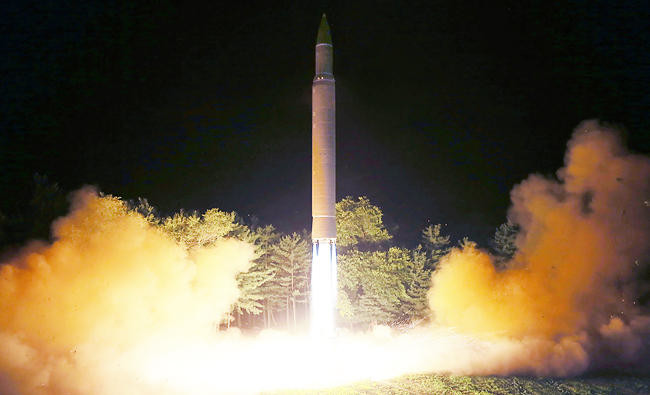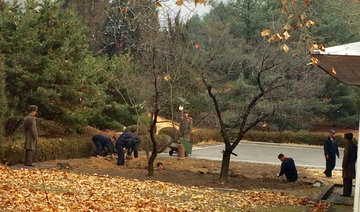WASHINGTON: North Korea says it successfully tested a new, nuclear-capable intercontinental-ballistic missile (ICBM) that could target the entire US mainland.
The North’s state television said Wednesday the new ICBM was “significantly more” powerful than the previous long-range weapon the North tested.
The report called the weapon a Hwasong 15. The launch was detected after it was fired early Wednesday morning from a site near Pyongyang.
North Korea will make an “important” announcement through television and radio at noon local time hours after it tested an apparent intercontinental ballistic missile.
The report on state radio Wednesday did not elaborate on the topic of the announcement.
The missile test-launched from near Pyongyang appeared to be North Korea’s most powerful weapon yet and could put Washington and the entire eastern US seaboard within range.
US Vice President Mike Pence is warning North Korea not to test President Donald Trump’s resolve.
Pence says in remarks at a Hudson Institute award dinner in New York that the administration is considering “additional measures” following the intercontinental ballistic missile test.
Pence says Pyongyang would do well “not to test the resolve of this president or the capabilities of the armed forces of the United States of America.”
He adds that “all options” remain on the table.
Pence was introduced at the event by conservative media mogul Rupert Murdoch, who called Pence a “positive” and “calming influence” at the White House.
President Donald Trump has spoken with South Korean President Moon Jae-in to discuss the countries’ response to North Korea’s latest missile launch.
The White House says both leaders “underscored the grave threat that North Korea’s latest provocation poses” not only to US and South Korea, “but to the entire world.”
The two presidents also “reaffirmed their strong condemnation of North Korea’s reckless campaign to advance its nuclear and ballistic missile programs, noting that these weapons only serve to undermine North Korea’s security and deepen its diplomatic and economic isolation.”
Trump and Moon spoke at length about the threat posed by North Korea during Trump’s trip to Asia earlier this month.
South Korean President Moon Jae-in has told government officials to “closely review” whether the latest North Korean missile launch will affect South Korean efforts to successfully host next year’s Winter Olympics in Pyeongchang.
Seoul’s presidential office reported Wednesday that Moon said during a National Security Council meeting that it would be important to find ways to “stably manage” the situation.
South Korean preparations for the February games have been overshadowed by North Korea’s nuclear and missile tests this year. France has said its Olympic team won’t travel to South Korea if its safety cannot be guaranteed.
South Korea has been hoping North Korea takes part in the games to ease concerns, but it’s unclear whether the North will.
North Korea boycotted the 1988 Summer Olympics in Seoul and has ignored the South’s proposals for dialogue in recent months.
South Korean President Moon Jae-in has raised concerns that North Korea’s perfection of an intercontinental ballistic missile would let regional security “spiral out of control” and make the United States consider a pre-emptive strike against the North.
Seoul’s presidential office said Wednesday that Moon said during a National Security Council meeting that it would be important to prevent a situation where North Korea miscalculates and threatens the South with nuclear weapons or the US considers a pre-emptive strike to eliminate the threat.
Moon has called for his military to take further steps to strengthen its capabilities following a recent agreement between Seoul and Washington to lift the warhead payload limits on South Korean missiles.
North Korea launched its latest missile early Wednesday local time. It landed in the Sea of Japan.
President Donald Trump is speaking with Japanese Prime Minister Shinzo Abe after North Korea launched what the Pentagon said was an intercontinental ballistic missile.
White House social media director Dan Scavino Jr. tweeted a photo of Trump on Tuesday in his office. He says Trump was “speaking with @JPN_PMO @AbeShinzo, regarding North Korea’s launch of a intercontinental ballistic missile into the Sea of Japan...”
North Korea abruptly ended a 10-week pause in its weapons testing early Wednesday local time in a move that’s escalating already high tensions with Washington.
In response to the launch, Trump said the United States will “take care of it.”
Abe says Japan will not back down against any provocation and would maximize pressure on the North in its alliance with the US
South Korean President Moon Jae-in has called North Korea’s latest missile test a “serious threat” to global peace and stressed the need for stronger sanctions and pressure against Pyongyang to discourage its nuclear ambitions.
Moon said Wednesday at a National Security Council meeting that the South will not “sit and watch” North Korea’s provocations and will work with the United States to strengthen its security.
Moon says South Korea anticipated the latest North Korean launch and prepared for it.
South Korea’s military conducted its own missile drills that started just minutes after North Korea’s launch was detected.
The UN Security Council has scheduled an emergency meeting on North Korea’s latest ballistic missile launch.
Italy chairs the council and its spokesman says the Wednesday afternoon meeting was requested by Japan, the US and South Korea.
North Korea abruptly ended a 10-week pause in its weapons testing Tuesday by launching what the Pentagon said was an intercontinental ballistic missile.
The Security Council has already imposed its toughest-ever sanctions on Kim Jong Un’s government in response to its escalating nuclear and ballistic missile programs and the US and Japan are likely to seek even stronger measures.
The launch was possibly North Korea’s longest. It is certain to raise tensions in the UN’s most powerful body.
Defense Secretary Jim Mattis says North Korea is continuing to build missiles that can “threaten everywhere in the world.”
Mattis says a missile that North Korea launched early Wednesday local time flew higher than its previous projectiles. He says South Korea has fired pinpoint missiles into surrounding waters to make certain that North Korea understands it can be “taken under fire” by the South.
He says North Korea is endangering world peace, regional peace and “certainly the United States.”
North Korea ended a 10-week pause in its weapons testing and threatened to heighten regional tensions by launching an intercontinental ballistic missile that landed in the Sea of Japan.
Mattis spoke Tuesday during a White House meeting with President Donald Trump and the top Republican congressional leaders.
President Donald Trump says the United States will “take care of it” following North Korea’s latest missile launch.
Trump told reporters Tuesday that “it is a situation that we will handle.”
The White House said earlier that Trump was briefed on North Korea’s ballistic missile launch early Wednesday local time, its first in two months. Press secretary Sarah Sanders tweeted that Trump “was briefed, while missile was still in the air, on the situation in North Korea.”
The Pentagon says it detected and tracked a single North Korean missile launch and believes it was an intercontinental ballistic missile.
At the time of the launch, Trump was in a meeting with Senate Republicans on Capitol Hill.
Japan’s UN Ambassador Koro Bessho says the government has told the North Koreans “that we criticize their behavior in the strongest terms possible” following a new missile launch.
He told reporters Tuesday at UN headquarters that “we are very concerned and we have condemned them publicly.”
UN Security Council President Sebastiano Cardi says he has been in contact with key UN members, but no request has been made yet for a meeting.
Cardi says he is scheduled to brief the Security Council on Wednesday.
Japan’s chief Cabinet secretary says the missile might have landed inside the country’s exclusive economic zone in the Sea of Japan.
Cardi says if it fell in that zone, it would be an “even greater” danger.
Japan’s chief Cabinet secretary says North Korea has fired a missile that might have landed inside the country’s exclusive economic zone in the Sea of Japan.
Yoshihide Suga says the missile appears to have been fired from North Korea’s western coast and the government is gathering information and analyzing the launch data.
Suga says repeated provocation by the North is unacceptable and Tokyo has lodged a strong protest.
The Pentagon says it detected and tracked a single North Korean missile launch and believes it was an intercontinental ballistic missile.
Pentagon spokesman Col. Rob Manning said Tuesday that the missile was launched from Sain Ni, North Korea, and traveled about 1,000 kilometers (about 620 miles) before landing in the Sea of Japan.
Manning says the Pentagon’s information is based on an initial assessment of the launch. He says a more detailed assessment was in the works.
The White House says President Donald Trump has been briefed on North Korea’s apparent ballistic missile launch.
Press secretary Sarah Sanders says in a tweet that Trump “was briefed, while missile was still in the air, on the situation in North Korea.”
At the time of the launch, Trump was in a meeting with Senate Republicans on Capitol Hill.
A US official says North Korea has conducted its first missile launch in more than two months.
A US official says North Korea has conducted its first missile launch in more than two months.
The official wasn’t authorized to speak publicly on the matter and demanded anonymity.
The Pentagon on Tuesday was more cautious, calling it a “probable” missile launch. Col. Rob Manning, a spokesman said, “We detected a probable missile launch from North Korea” at approximately 1:30 p.m. EST. He said the Pentagon is assessing the situation and has no further information to provide, including what kind of missile may have been launched.
It would be the first North Korean missile test since it launched an intermediate-range ballistic missile on Sept. 15 that flew over northern Japan and into the Pacific Ocean.
The Yonhap news agency is reporting that North Korea has launched a ballistic missile.
The Yonhap news agency reports that North Korea has launched a ballistic missile.
South Korea’s military says the missile was fired from an area north of Pyongyang early Wednesday.
The news agency reported South Korea’s Joint Chiefs of Staff saying that it and US authorities are analyzing the trajectory.
The launch is the first since Sept. 15 when North Korea fired an intermediate ballistic missile.




























